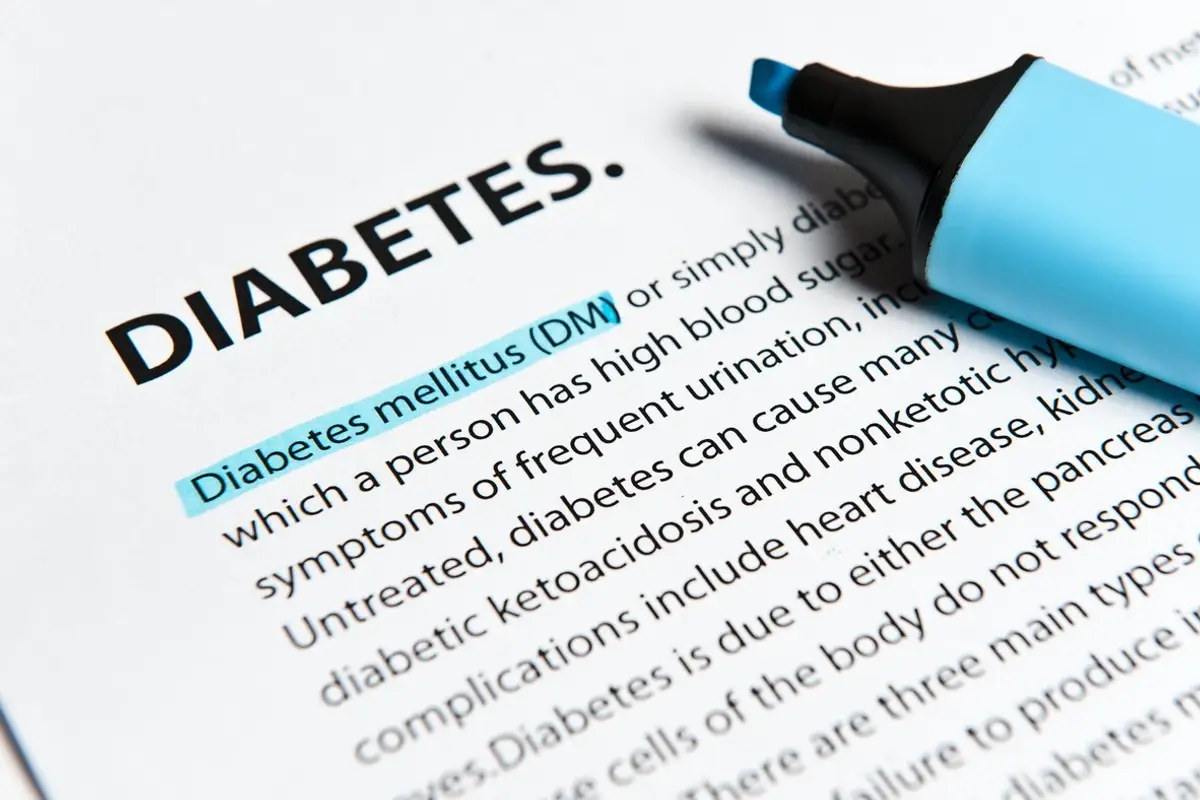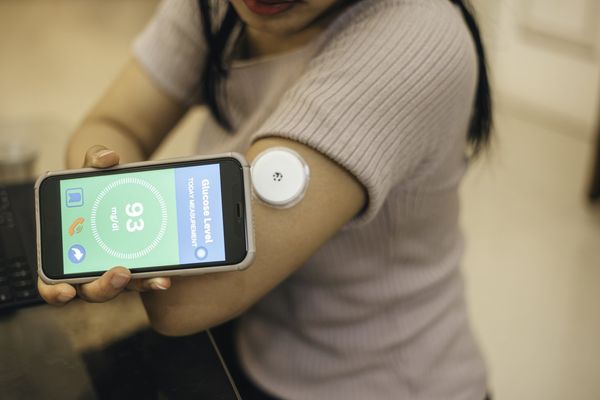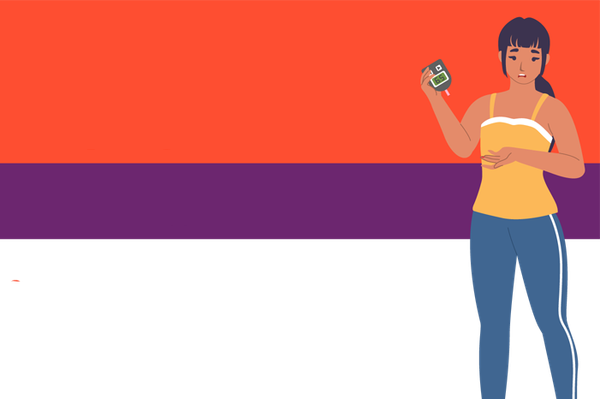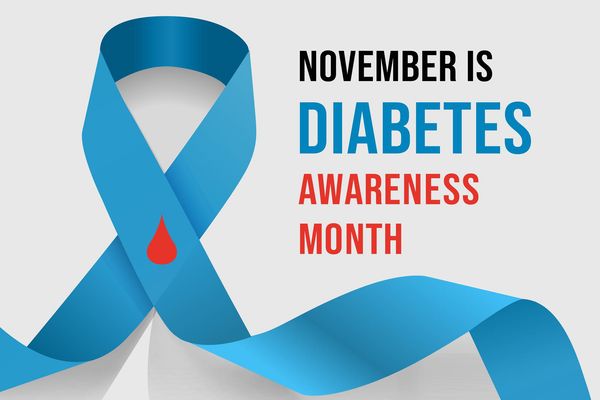November is American Diabetes Month.
Diabetes? It’s complicated.
For starters, there are different types of diabetes. And symptoms can vary from person to person. But people living with diabetes always have one thing in common: high blood sugar levels.
That may not sound like a big deal, but without treatment, high blood sugar can lead to other serious health conditions.
More than 37 million Americans — about 1 in 9 women — have diabetes. Managing the disease can be tough on the body and the mind. Although treatment options have advanced over the years (shout out to insulin since 1922) one recent study found that only half of the people living with diabetes are meeting goals for lowering their blood sugar levels.
Understanding the types and treatments can help people manage the disease.
What is diabetes?
Diabetes is a disease where your body either doesn’t make enough insulin (the hormone that turns sugar into energy) or doesn’t know how to use the insulin your body does make in the right way.
Insulin is important because it’s like a gatekeeper for glucose (sugar) to enter your cells to be changed into energy. Without insulin, sugar builds up in the bloodstream and causes high blood sugar levels, which can lead to serious health problems like heart attack, stroke, kidney disease, nerve damage and diabetic ketoacidosis (a life-threatening blood chemical imbalance), coma or even death.
What are the types of diabetes?
There are three main types of diabetes.
- Type 1 diabetes is a lifelong autoimmune disease where your immune system attacks the cells in your body that produce insulin. No one knows why this happens, but this stops your body from making insulin. You will have to take injectable insulin to help manage blood sugar. About 1 in 100 people with diabetes have Type 1. It’s usually diagnosed in children and young adults but can develop at any age.
- Type 2 is when your cells don’t respond normally to insulin, also called insulin resistance. Your pancreas has to work extra hard to make more insulin to get the cells to respond. But over time it can’t keep up. Eventually, too much sugar circulates in the blood, which can lead to vision loss and kidney disease among other serious health conditions. Type 2 is the most common form of diabetes and usually diagnosed in adults. About 9 out of 10 people with diabetes have Type 2 diabetes.
- Gestational diabetes develops during pregnancy. Similar to Type 2, changes in your body cause insulin resistance, which causes high blood sugar. The good news is that most people with gestational diabetes return to normal blood sugars after the baby is born. But it’s important to note that people with gestational diabetes are at high risk for Type 2 diabetes later in life. In fact, about half of women with gestational diabetes will develop Type 2 at some point.
What is prediabetes?
Prediabetes is when your blood sugar levels are higher than normal but not so high that you’re diagnosed with Type 2. You may not have any symptoms — 4 out of 5 people with prediabetes don’t know they have it — but prediabetes puts you at high risk for Type 2 and other diabetes-related problems.
Prediabetes is very common. About 1 in 3 adults in the U.S. have prediabetes. Lifestyle choices like eating healthy foods and being physically active can help keep blood sugar levels in check and bring down the risk for developing diabetes.
What are the risk factors for diabetes?
Although risk factors can vary depending on the type of diabetes, common risk factors include:
- A family history of diabetes
- Age (being over 45)
- High blood pressure
- Having overweight or obesity
- A non-active lifestyle
Race also plays a role regarding type and disease. White people have the highest rate of Type 1 diabetes. Type 2 diabetes is more common in Black, Hispanic, Native American and Asian people and Pacific Islanders compared to white people.
When it comes to income and education, the 2022 National Diabetes Statistics Report reported diabetes data by income for the first time. The report showed that diabetes was also associated with poverty. And people with less education were more likely to have diabetes.
What are the symptoms of diabetes?
Diabetes symptoms vary depending on type and how high your blood sugar is. To make it even more complicated, some people have no symptoms at all.
When people do have symptoms, they include:
- Weight loss
- Fatigue
- Weakness
- Blurry vision
- Peeing more often
- Increased thirst
- Mood changes
- Slow-healing wounds
How is diabetes different for women compared to men?
Diabetes affects slightly more men than women. But diabetes-related health issues are greater for women. For example, people living with diabetes are at high risk for heart disease. But that risk increases by about four times for women with diabetes compared to two times for men with the disease.
Read: The Connection Between Diabetes, Cardiovascular Disease and Women's Health >>
Women with diabetes are also at higher risk for diabetes-related health problems including:
- Blindness
- Kidney disease
- Depression
In addition to these health conditions, diabetes can affect the reproductive system.
One example: Women with diabetes are at high risk for yeast infections and urinary tract infections. This is because high blood sugar can cause poor circulation and affect the ability to fight infection.
Diabetes can also affect periods. You may have heavy periods or longer periods and changes in hormones can cause blood sugars to fluctuate.
For many women, menopause causes weight gain, hot flashes and night sweats — all things that can affect blood sugar and make diabetes harder to manage. And vaginal dryness before and during menopause can be a side effect of reduced blood flow and nerve damage because of diabetes.
Read: From Hot Flashes to Night Sweats, a Rundown of Vasomotor Symptoms During Menopause >>
What are treatment options for diabetes?
Treatment plans depend on the type of diabetes, but there are options for anyone to manage the disease.
Type 1 — requires insulin via injection. This may be through shots or an insulin pump.
Type 2 — treatment can include medication (pills and/or injectables), insulin, weight loss, and diet changes
Talk to your healthcare provider if you think you have prediabetes or if you need help managing your diabetes.
This educational resource was created with support from Eli Lilly and Company, a 2023 HealthyWomen Corporate Advisory Council member.
- Insulin Therapy and Your Life ›
- 10 Common Misconceptions About Diabetes ›
- Diabetes ›
- What You Need to Know About Diabetes ›
- S. Epatha Merkerson on the Sweet Truth About Diabetes - HealthyWomen ›
- Are You At Risk of Developing Diabetes? - HealthyWomen ›
- ¿Tienes riesgo de desarrollar diabetes? - HealthyWomen ›
- The Link Between Diabetes and Your Heart - HealthyWomen ›
- Diabetes and Heart Attack Risk: What's the Connection? - HealthyWomen ›







